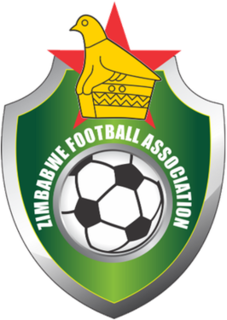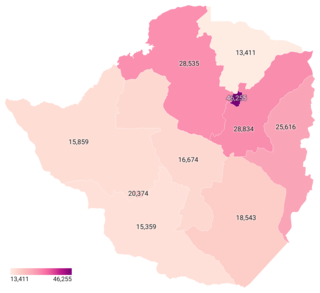Related Research Articles

Zimbabwe, officially the Republic of Zimbabwe, is a landlocked country located in Southeast Africa, between the Zambezi and Limpopo Rivers, bordered by South Africa to the south, Botswana to the south-west, Zambia to the north, and Mozambique to the east. The capital and largest city is Harare. The second largest city is Bulawayo. A country of roughly 15 million people, Zimbabwe has 16 official languages, with English, Shona, and Ndebele the most common.

The economy of Zimbabwe is mainly relies on its tertiary industry, which makes up to 60% of the total GDP as of 2017. Zimbabwe has the second biggest informal economy as a share of its economy, which has a score of 60.6%. Agriculture and mining largely contribute to exports. The economy of Zimbabwe grew at an average of 12% from 2009 to 2013, rendering it one of the fastest growing economies in the world. It had recovered from its negative growth from 1998 to 2008, before it slowed to 0.7% growth in 2016.

Harare is the capital and most populous city of Zimbabwe. The city proper has an area of 960.6 km2 (371 mi2) and a population 2,123,132 in the 2012 census and an estimated 3,120,917 in its metropolitan area in 2019. Situated in north-eastern Zimbabwe in the country's Mashonaland region, Harare is a metropolitan province, which also incorporates the municipalities of Chitungwiza and Epworth. The city sits on a plateau at an elevation of 1,483 metres above sea level and its climate falls into the subtropical highland category.

Great Zimbabwe is a medieval city in the south-eastern hills of Zimbabwe near Lake Mutirikwe and the town of Masvingo. It is thought to have been the capital of a great kingdom, although which kingdom is not certain, during the country's Late Iron Age. Construction on the city began in the 9th century and continued until it was abandoned in the 15th century. The edifices are believed to have been erected by the ancestral Shona. The stone city spans an area of 7.22 square kilometres which could have housed up to 18,000 people at its peak, giving it a population density of approximately 2,500 per square kilometre. It is recognised as a World Heritage Site by UNESCO.
The 1983 Cricket World Cup was the 3rd edition of the Cricket World Cup tournament. It was held from 9 to 25 June 1983 in England and Wales and was won by India. Eight countries participated in the event. The 1983 World Cup was full of dramatic cricket all through the tournament. Teams like India and Zimbabwe who were not playing well during those times scored victories over the West Indies and Australia respectively. England, India, Pakistan and tournament favourites West Indies qualified for the semi-finals. The preliminary matches were played in two groups of four teams each, and each country played the others in its group twice. The top two teams in each group qualified for the semi-finals.

Zimbabwe Rhodesia was an unrecognised state that existed from 1 June 1979 to 11 December 1979. Zimbabwe Rhodesia was preceded by an unrecognised republic named Rhodesia and was briefly followed by the re-established British colony of Southern Rhodesia, which according to British constitutional theory had remained the lawful government in the area after Unilateral Declaration of Independence (UDI) in 1965. About three months later, the re-established colony of Southern Rhodesia was granted internationally recognised independence within the Commonwealth as the Republic of Zimbabwe.

The Zimbabwe African National Union – Patriotic Front (ZANU–PF) is a political organisation which has been the ruling party of Zimbabwe since independence in 1980. The party was led for many years under Robert Mugabe, first as Prime Minister with the Zimbabwe African National Union (ZANU) and then as President from 1987 after the merger with the Zimbabwe African People's Union (ZAPU) and retaining the name ZANU–PF, until 2017, when he was removed as leader.

Bulawayo is the second largest city in Zimbabwe, and the largest city in the country's Matabeleland region. The city's population is disputed; the 2012 census listed it at 653,337, while the Bulawayo City Council claimed it to be about 1.2 million. Bulawayo covers an area of about 1,707 square kilometres in the western part of the country, along the Matsheumhlope River. Along with the capital Harare, Bulawayo is one of two cities in Zimbabwe that is also a province.

The Zimbabwe national cricket team, also known as Chevrons represents Zimbabwe in men's international cricket and is administered by Zimbabwe Cricket. Zimbabwe has been a Full Member of the International Cricket Council (ICC) since 1991. As of 7 April 2021, Zimbabwe is currently ranked 10th in Tests, 12th in One Day Internationals (ODIs) and 11th in Twenty20 Internationals (T20Is) by the ICC.

The Zimbabwe national football team, represents Zimbabwe in men's international football and is controlled by the Zimbabwe Football Association (ZIFA), formerly known as the Football Association of Rhodesia. The team has never qualified for the FIFA World Cup finals, but has qualified for the Africa Cup of Nations five times. Zimbabwe has also won the COSAFA Cup a record six times. The team represents both FIFA and Confederation of African Football (CAF).

The Rhodesian Bush War—also called the Second Chimurenga as well as the Zimbabwe War of Liberation—was a civil conflict from July 1964 to December 1979 in the unrecognised country of Rhodesia . The conflict pitted three forces against one another: the Rhodesian white minority-led government of Ian Smith ; the Zimbabwe African National Liberation Army, the military wing of Robert Mugabe's Zimbabwe African National Union; and the Zimbabwe People's Revolutionary Army of Joshua Nkomo's Zimbabwe African People's Union.
White Zimbabweans are people in Zimbabwe who are of European descent. In linguistic, cultural, and historical terms, these Zimbabweans of European ethnic origin are divided among the English-speaking descendants of British settlers, the Afrikaans-speaking descendants of Afrikaners from South Africa, and those descended from Greek and Portuguese immigrants.

Econet, officially known as Econet Global Ltd, is a diversified telecommunications group with operations and investments in Africa, Europe, South America and the East Asia Pacific Rim, offering products and services in the core areas of mobile and fixed telephony services, broadband, satellite, optical fiber networks and mobile payment.

The Reserve Bank of Zimbabwe is the central bank of Zimbabwe headquartered in the capital city of Zimbabwe, Harare.

Emmerson Dambudzo Mnangagwa is a Zimbabwean authoritarian revolutionist and politician who has served as President of Zimbabwe since 24 November 2017. A member of ZANU–PF and a longtime ally of former President Robert Mugabe, he held a series of cabinet portfolios and was Mugabe's Vice President until November 2017, when he was dismissed before coming to power in a coup d'état. He secured his first full term as president in the disputed 2018 general election.

Robert Gabriel Mugabe was a Zimbabwean revolutionary and politician who served as Prime Minister of Zimbabwe from 1980 to 1987 and then as President from 1987 to 2017. He served as Leader of the Zimbabwe African National Union (ZANU) from 1975 to 1980 and led its successor political party, the ZANU – Patriotic Front (ZANU–PF), from 1980 to 2017. Ideologically an African nationalist, during the 1970s and 1980s he identified as a Marxist–Leninist, and as a socialist after the 1990s.

The Zimbabwean dollar was the name of four official currencies of Zimbabwe from 1980 to 12 April 2009. During this time, it was subject to periods of extreme inflation, followed by a period of hyperinflation.

The president of Zimbabwe is the highest office in the executive branch of the country's government. The president is head of state of Zimbabwe, elected by direct universal suffrage using a two-round system. Formerly a ceremonial role, the president is now also the head of government. As per the act of parliament, the president serves as the chancellor of the University of Zimbabwe. The president serves a maximum of two five-year terms.

The COVID-19 pandemic in Zimbabwe is part of the worldwide pandemic of coronavirus disease 2019 caused by severe acute respiratory syndrome coronavirus 2 .The COVID-19 pandemic was confirmed to have reached Zimbabwe in March 2020. Some of Zimbabwe's provinces, especially Manicaland, Masvingo and Mashonaland East, also struggled with a malaria outbreak at the same time. Though malaria is treatable, the healthcare system faces drug shortages and increased strain with the spread of COVID-19.

On 22 February 2021, Zimbabwe launched their national COVID-19 vaccination program using the Sinopharm BIBP vaccine. As of 12 December 2021, 3,956,020 people have received their first dose, and 2,976,972 people have received their second dose.